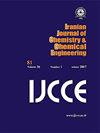A 2E Analysis and Optimization of a Hybrid Solar Humidification-Dehumidification Water Desalination System and Solar Water Heater
IF 1.3
4区 工程技术
Q4 CHEMISTRY, MULTIDISCIPLINARY
Iranian Journal of Chemistry & Chemical Engineering-international English Edition
Pub Date : 2021-11-09
DOI:10.30492/IJCCE.2021.535474.4870
引用次数: 3
Abstract
This study presents an energy-exergy analysis of a Humidification-Dehumidification (HD) solar water desalination system. The extensive application of the HD system lies in its low energy consumption and ability to exploit solar energy to supply all the heat energy demands. The unsteady governing equations were solved until the system reached a steady state. The simulations were done with the Euler approach to solving the system of energy balance equations numerically. This study's main goal was to investigate the effect of different configurations of the hybrid system and various operating conditions on the performance of the solar HD water desalination system. The optimum configuration was selected based on thermodynamic and exergy analyses. The effects of important parameters such as inlet water and air mass flow rate in the humidifier and dehumidifier water temperature and mass flow rate on the system's operation were studied. This paper also explored the feasibility of the extra heat as a domestic water heater under various conditions. Based on exergy analysis, it is shown that the solar desalination system with air-water preheater with the power of 1057.9 W had the most exergy destruction in comparison with the two other systems (i.e., water preheater system and air preheater system with the respective exergy destructions of 901.3 W and 75.3 W). Comparing the values of freshwater production, exergy destruction, and exergy efficiency, the solar system with a water preheater was selected as the optimum one.太阳能加湿-除湿混合海水淡化系统与太阳能热水器的2E分析与优化
本研究提出了一种加湿-除湿(HD)太阳能海水淡化系统的能量-用能分析。HD系统的广泛应用在于其低能耗和利用太阳能提供所有热能需求的能力。求解非定常控制方程,直至系统达到稳态。采用欧拉法对能量平衡方程组进行了数值模拟。本研究的主要目的是研究混合系统的不同配置和不同运行条件对太阳能HD海水淡化系统性能的影响。通过热力学和火用分析,选择了最优配置。研究了加湿器、除湿器进水、空气质量流量等重要参数对系统运行的影响。本文还探讨了在各种条件下,余热作为生活热水器的可行性。通过对水用分析可知,与水预热器功率为1057.9 W的太阳能海水淡化系统相比(水预热器功率为901.3 W、空气预热器功率为75.3 W),水用破坏最大。通过对淡水产量、水用破坏和水用效率的比较,选择带水预热器的太阳能海水淡化系统为最佳。
本文章由计算机程序翻译,如有差异,请以英文原文为准。
求助全文
约1分钟内获得全文
求助全文
来源期刊

Iranian Journal of Chemistry & Chemical Engineering-international English Edition
CHEMISTRY, MULTIDISCIPLINARY-ENGINEERING, CHEMICAL
CiteScore
2.80
自引率
22.20%
发文量
0
审稿时长
6-12 weeks
期刊介绍:
The aim of the Iranian Journal of Chemistry and Chemical Engineering is to foster the growth of educational, scientific and Industrial Research activities among chemists and chemical engineers and to provide a medium for mutual communication and relations between Iranian academia and the industry on the one hand, and the world the scientific community on the other.
 求助内容:
求助内容: 应助结果提醒方式:
应助结果提醒方式:


